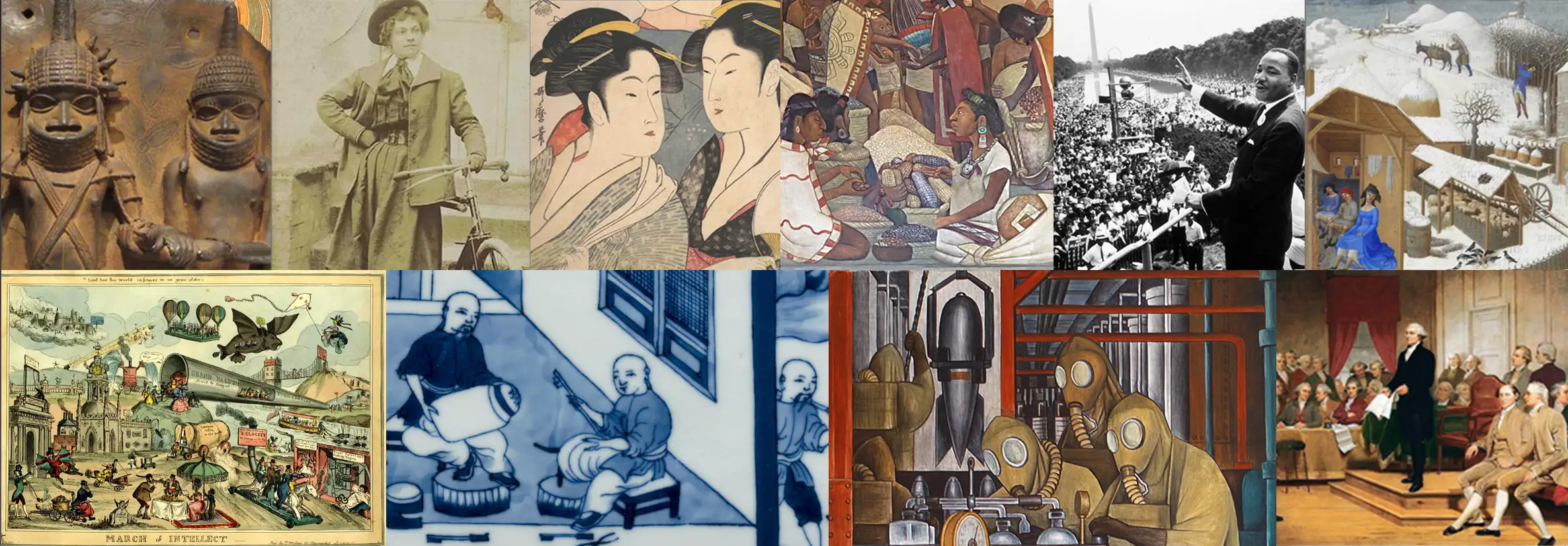Eggers Chronicles Congo Refugee Experience
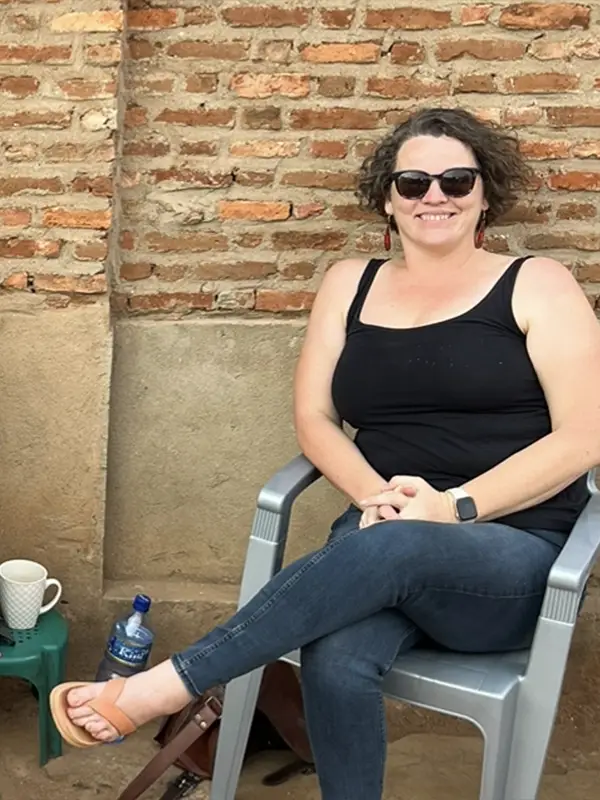
Assistant Professor Nikki Eggers published her first monograph in 2023, Unruly Ideas: A History of the Kitawala on Congo (Ohio University Press, 2023). There she combined oral histories with archival research to recount the history of the Congolese religious movement Kitawala from its colonial beginnings in the 1920s through its continued practice in some of the most conflict-riven parts of the eastern Democratic Republic of Congo today.
Eggers’s new project is “Refuge in the Spirit: Religion in the Lives of Congolese Refugees,” supported by a prestigious National Endowment for the Humanities grant. Eggers, who has been recognized for her valuable work supporting East Tennessee’s own community of Congolese refugees, is teaming up with Roger Alfani of Seton Hall University on this research. Though on a well-deserved leave this year, we asked her to tell us more about the work in progress.
Most historians in our department conduct research in more-or-less comfortable archives, but yours involves field work in refugee camps in Kenya and Burundi. What are some of the challenges and opportunities of this sort of research?
What I do is indeed a little unorthodox for historians! Though I think that most historians recognize the value that oral history methods bring to the field. Conducting interviews with refugees offers a multitude of opportunities to better understand the lived experiences of people affected by what I think can be called one of greatest humanitarian crises of the past half century: the war in the Democratic Republic of Congo (DR Congo). Our interviews help us to understand not only these individual experiences, but also how certain systems—particularly migration networks and humanitarian systems like the UNHCR—function (and don’t function). The interviews also offer insight to the social and political conditions on the ground in Congo and various host countries (Kenya, Burundi, Uganda, US) and serve as a kind of archive of the present that can help future historians understand this era better as well.
Of course, as you note, it does not come without challenges. Some of these challenges are logistical. Most of the refugee camps we visited are, by design, located in remote and difficult to access areas. But there are also ethical challenges when conducting research with vulnerable individuals like refugees. On the one hand, we must protect the identities of people who have often fled politically contentious circumstances and whose lives and stories are often interrogated by refugee systems themselves. We don’t want someone’s resettlement case to be adversely affected by something they told us in confidentiality or for them to have repercussions for criticizing people and institutions with power over them and their livelihoods.
On the other hand, this kind of research can touch on very traumatic events in people’s lives and we must be careful to protect both participants and, frankly, ourselves as researchers from the adverse effects that interrogating such trauma can have. We have to be cognizant of such risks and take steps to mitigate them.
Your project examines the religious lives of these refugees. What draws you to that focus?
Professor Alfani and I both have extensive experience writing about the role of religion in DR Congo. He is a religious studies expert who has published widely on the role of religious actors and institutions in peace building processes in eastern Congo. I have also published on the role of religion and spirituality in the social and political history of Congo, in both the colonial and post-colonial eras. So, our interest in the significance of religion, spirituality, and religious actors grows out of our collective expertise on the subject and experience observing the central role that religion and spirituality play in the socio-political terrain of Congo, both in the present and the past.
As we both became interested in the experiences of refugees, we began to realize that religion has often been treated as a marginal aspect of that experience in the refugee studies literature, when discussed at all. Knowing what we already knew about the role of religion and spirituality in Congo, we found this to be a significant oversight.
And our research up to this point really has illustrated that such oversight obscures an important aspect of the social and intellectual lives of refugee individuals and communities. Focusing on religion helps us to see important forms of agency and resilience that are exercised by people who are too often treated as a problem to be solved. Moreover, because religion touches on so many other parts of people’s lives it also helps us to see the myriad of challenges refugees have experienced—and continue to experience—as they navigate their displacement.
Historical research is so often a solitary endeavor, but through this grant you are able to work with Roger Alfani. What does this chance to collaborate add to your research?
It is hard to overstate the value that collaboration has added to this project. To begin with, he and I have different but complementary disciplinary expertise. Alfani is very much a social scientist, who has extensive knowledge of social science theory and praxis, including significant experience conducting qualitative research on religion, conflict, and peace building in Congo. Meanwhile, as a historian, I bring important skills in historical analysis and narrative building, as well as extensive experience conducting and analyzing oral history interviews at multiple sites in the field in Congo. Our different disciplinary perspectives often lead us to ask different kinds of questions, opening new realms of inquiry that neither would necessarily investigate alone.
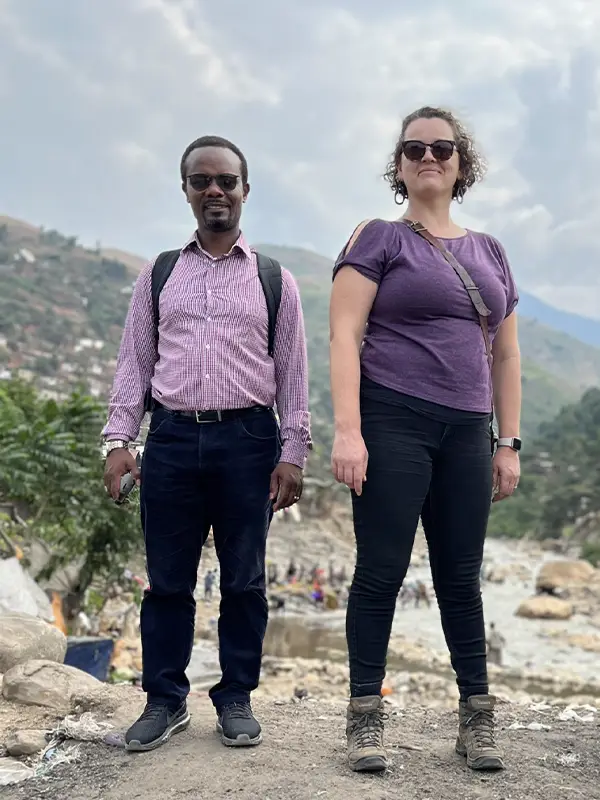
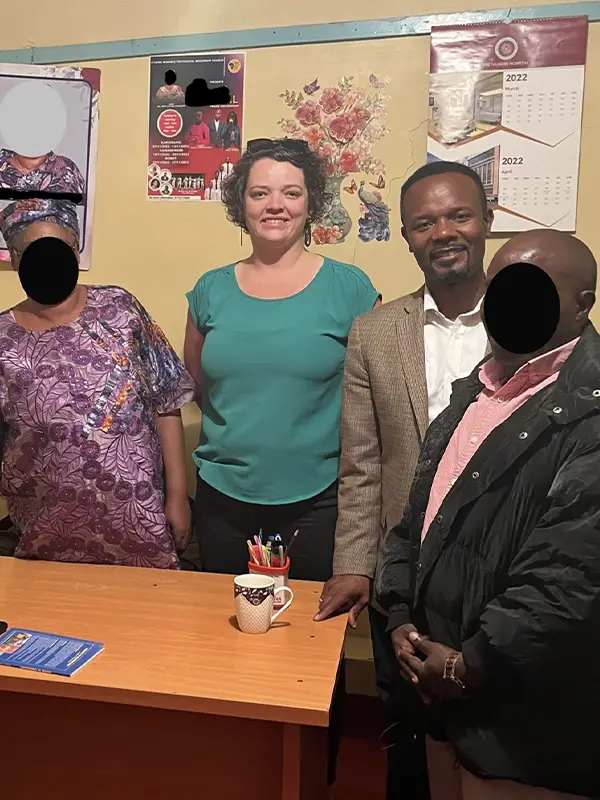
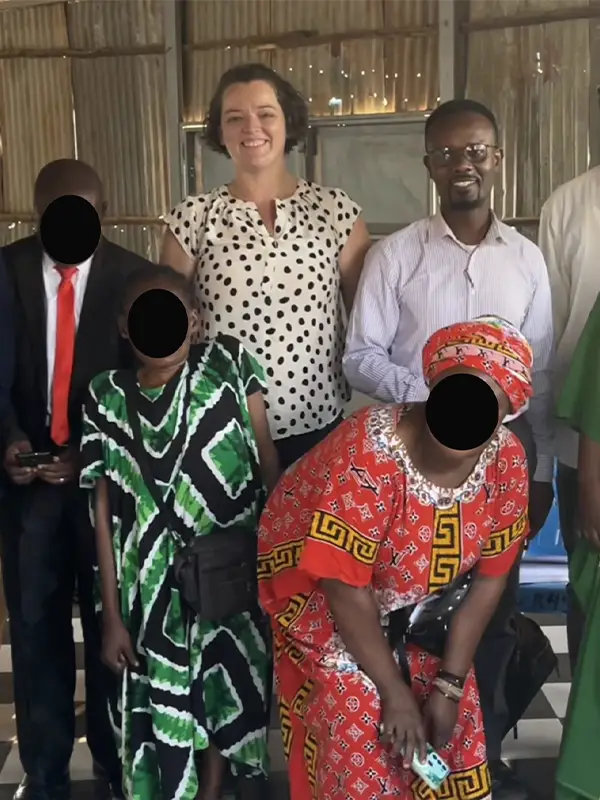
Our different identities have also shaped our research in profound ways. As someone born and raised in Congo, who has also lived and been educated outside of Congo, Alfani has brought unique knowledge and experiences, as well as personal networks, to the project that have been crucial to the process of conducting and interpreting our research. As an informed outsider, with an extensive knowledge of the regional history and a number of my own connections in the field, I bring a different perspective and different networks that have helped us to navigate the research process and interpret the findings. We have also found that our different racial and gender identities—both how we present to and are interpreted by others and how we experience the world—have shaped both the process of research and our interpretation of the findings. As have our different personal relationships to and experiences with religion and spirituality. Because I assure you, we did not escape—nor did we try to escape—conversations about our own faith with participants in this research. Our methodological approach was to treat people very much like equals in a conversation, rather than subjects of scientific observation. Overall, we are both keenly aware that this research has been quite different—and I think richer—than it might have been had either of us done it alone.
The college has recognized the valuable work you have done to support those Congolese refugees who have arrived in East Tennessee in recent years. In addition to interviewing refugees in Africa, you are studying the lived experience of these new neighbors here in Tennessee. What dimension does this add to your study of the religious life of these families?
As I have indicated above, we have observed in our research—both for this project and previous projects—the central role that religion and faith play in the lives of many Congolese people. Part of the reason we are interested in talking to refugees resettled to Knoxville is to understand whether and how that role has changed as they have become a part of American society. How has resettlement reshaped their understanding of faith and spirituality? How has it reshaped their religious communities? How has resettlement reshaped their understandings of themselves and their own identities and, in turn, their understanding of the role of churches and religious communities in their lives?
On the other hand, how has the religion and faith community served as a mechanism to preserve a sense of identity and community in a very different cultural, political, and economic context of the US? These questions matter both because they offer insight into the larger history of Congolese people and the US, but also because they can help us to better understand how to serve and support resettled refugees.
Last fall Eggers and Alfani co-wrote an editorial essay based on their research visits to the refugee camps in Africa, sounding the alarm regarding dangerous food shortages.
